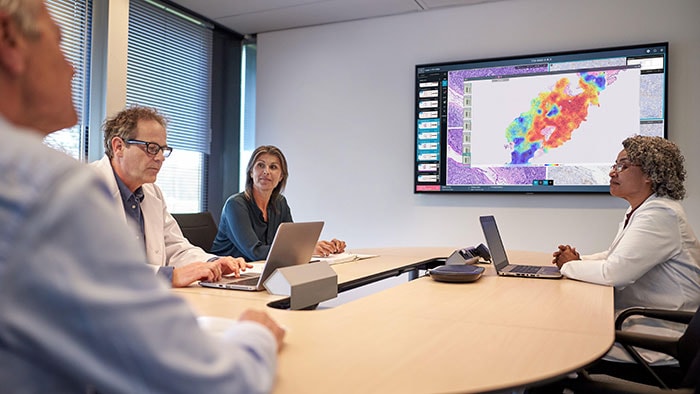
At the heart of today’s healthcare transformation is the need to look after not only patients, but also the environment that surrounds them. This dual responsibility is central to Philips’ mission, according to Robert Metzke, Global Head of Sustainability at Philips. However, embracing sustainability in a healthcare industry already burdened with staff shortages, pressure to reduce costs, and other headwinds has proven to be a formidable task. “But healthcare can and must become part of the solution,” he said during a recent webinar hosted by The Boston Globe.
By embedding and integrating sustainability in every part of the health system, we can help ensure the best care for the patient does no harm to the planet.
The webinar brought together leading voices in sustainable healthcare who shared real examples of their organizations actively driving positive change. They discussed the transformative impact of making sustainability a core strategy pillar, public-private partnerships and the role of sustainable technologies in improving patient care while supporting sustainability goals.
Integrating sustainability into the healthcare strategy
One key theme that emerged was the importance of integrating sustainability into healthcare practices, not as an afterthought but as a core principle. By prioritizing investments in sustainability, health systems like Boston Medical Center (BMC) have effectively improved their environmental impact and realized tangible financial benefits.
We haven’t treated sustainability like a separate initiative that’s off to the side. It is integrated into the overall strategy. I think that has been critical to our success. By improving the bottom line, we’re creating new resources that the organization can then reinvest into improving access to care.
The conversation also highlighted BMC’s experience with green bonds and their financial benefits. The $5 million in cost savings enabled BMC to invest in projects like the net zero Brockton Behavioral Health Center, which helped expand access to care for patients in need.
The power of partnerships
“Partnerships are absolutely essential for tackling the largest challenges of our times,” said Secretary of Health and Human Services for the Commonwealth of Massachusetts. The discussion highlighted the need for partnerships across various sectors, including healthcare, technology, and government, to effectively address the challenges posed by climate change. The speakers explored the role of partnerships in influencing supply chains, promoting sustainable practices, and fostering a more resilient healthcare system. They emphasized the importance of integrating efforts to mitigate environmental impact within healthcare facilities and the broader community. “We need to bring in all sectors to work together towards a common goal,” said Dr. Reed Omary, Professor of Radiology at Vanderbilt University Medical Center.
Local boards of public health and local public officials can play a crucial role in advancing the cause of sustainability and climate action by being trusted messengers within their communities.
Role of technology
Technology plays a crucial role in driving innovation and efficiency. As highlighted in the conversation, embedding sustainability principles into the product development processes within the medtech community is a necessity. This integration of sustainability criteria can significantly reduce the environmental footprint of healthcare products and services. Furthermore, the discussion delved into the Scope 3 emissions – indirect emissions from purchased goods and services that account for more than two thirds (71%) of healthcare’s global carbon footprint, underscoring the importance of addressing the environmental impact beyond the hospital setting [1]. By collaborating with vendors and supply chains to adopt sustainable practices, healthcare institutions can reduce their overall carbon footprint and promote environmental responsibility throughout the entire value chain. Bob Biggio mentioned the impact of procurement practices on Scope 3 emissions, stating, “The impact we can have on Scope 3 is demand. If we are going to demand that we buy sustainable products, then that will change the available products. Through procurement, health systems can influence vendors to offer more sustainable products.” Lastly, Dr. Omary mentioned the opportunity for healthcare systems to inspire innovation in other sectors by taking the lead in sustainability initiatives. Dr. Omary emphasized the importance of healthcare systems being leaders in innovation, particularly in the context of sustainability and planetary health.
A future shaped by sustainable healthcare
The panelists shared a compelling narrative: sustainability and healthcare are inextricably linked, and the health of our planet directly affects patient health. Concluding the webinar, Robert Metzke issued a call to action for healthcare leaders to take bold steps in sustainability. Together, we can bridge the gap between present practices and a sustainable future for healthcare.
To further explore Philips’ initiatives and to take part in shaping a sustainable healthcare landscape, please visit https://www.philips.com/a-w/about/news/archive/features/2024/five-key-levers-for-sustainable-healthcare.html
Sources [1] Health Care Without Harm (2019). Health care’s climate footprint: How the health sector contributes to the global climate crisis and opportunities for action (p.22). https://noharm-global.org/documents/health-care-climate-footprint-report








